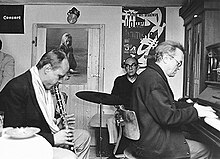Günter Boas
Günter Boas (born February 15, 1920 in Dessau , Germany; † December 14, 1993 in Selm , Germany) was a German jazz and blues musician (pianist, blues singer, jazz journalist and organizer).
Live and act
Boas could not finish his medical studies in Jena because he was denounced in 1943 for listening to jazz broadcasts on the radio; he came to a branch of the Buchenwald concentration camp at Walpersberg near Kahla and had to do forced labor there for the REIMAHG . Due to his studies, he was employed as a medical assistant in the camp's infirmary and was able to save the lives of many prisoners. As a member of the camp orchestra, he greeted the liberating Americans with swing music .
After the liberation Boas went to Frankfurt am Main , where he revived the Hot Club Frankfurt with Carlo Bohländer , Horst Lippmann and Olaf Hudtwalcker . As a pianist he played in the Hot Club's combos, initially mainly in American army clubs. He continued to work as publisher of the trade journal jazz home and designed the weekly program Blues for Monday for AFN between 1949 and 1959 . In 1949 he founded the legendary Two Beat Stompers , one of the most important traditional bands of the West German post-war period, which, for example, played regularly in the Jazzkeller Frankfurt under the direction of Werner Rehm .
In 1958 he moved to Dortmund , where he headed the jazz department of a record store. He was also active in the Dortmund jazz scene. He later headed the Hot Club in Iserlohn (1963–1966), performed jazz concerts until 1967 and then worked in the city of Lünen's cultural office . As a musician and record collector, he increasingly specialized in the blues and accompanied blues singers; Together with the musicians from Epitaph he recorded his album Blues Piano around 1970 . He also published numerous articles in jazz magazines and in 1986 a small monograph on the banjo player Rudi Appendix .
The legacy of the jazz and blues pioneer - his collection of records, magazines, tears, photos, letters and other documents - formed the basis for the Eisenach International Jazz Archive and the Lippmann + Rau music archive that emerged from it . The city of Lünen, where he worked for many years, named a street in his honor.
literature
- E. Dieter Fränzel , Jazz AGe Wuppertal (ed.): Sounds Like Whoopataal. Wuppertal in the world of jazz. Klartext-Verlag, Essen 2006, ISBN 3-89861-466-2 , p. 24.
- Konrad Heidkamp : There is a house in Eisenach . In: The time . 36/2007.
Web links
| personal data | |
|---|---|
| SURNAME | Boas, Günter |
| BRIEF DESCRIPTION | German jazz musician |
| DATE OF BIRTH | February 15, 1920 |
| PLACE OF BIRTH | Dessau , Germany |
| DATE OF DEATH | December 14, 1993 |
| Place of death | Selm , Germany |
